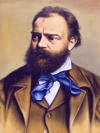 | Antonin Dvorák
(September 8, 1841 – May 1, 1904) was a Czech composer of romantic music, who employed the idioms and melodies of the folk music of his native Bohemia and Moravia in symphonic, oratorial, chamber and operatic works. Dvořák was born on September 8, 1841 in Nelahozeves, near Prague (then Austrian Empire, today the Czech Republic), where he spent most of his life. His father was a butcher, innkeeper, and professional player of the zither. He studied music in Prague's only Organ School at the end of the 1850s, and gradually developed into an accomplished player of the violin and the viola. Throughout the 1860s he played viola in the Bohemian Provisional Theater Orchestra, which from 1866 was conducted by Bedřich Smetana.
From 1892 to 1895, Dvořák was the director of the National Conservatory of Music in New York City, at a $15,000 annual salary–a large amount of money. The Conservatory had been founded by a wealthy and philanthropic socialite, Jeannette Thurber; it was located at 126-128 East 17th Street but was demolished in 1911 and replaced by what is now a high school. Here Dvořák met with Harry Burleigh, one of the earliest African-American composers, his pupil. Burleigh introduced traditional American Spirituals to Dvořák at the latter's request.
Dvořák wrote in a variety of forms: nine symphonies, many of his works also show the influence of Czech folk music, both in terms of rhythms and melodic shapes; perhaps the best known examples are the two sets of Slavonic Dances. Dvořák also wrote operas (the best known of which is Rusalka); serenades for string orchestra and wind ensemble; chamber music (including a number of string quartets, and quintets); songs; choral music; and piano music.
|